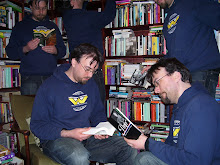The book is Ian Macpherson's Wild Harbour, first published in 1936. The edition I have is the 1996 Canongate Classics version: part of a series of works of great Scottish literature that also includes another book with one of my favourite titles, Elspeth Davie's The Man Who Wanted To Smell Books.

This appropriately fraught cover painting is actually a self-portrait by Alan Stones.

Here are three of his other paintings: ''Stories' - Clearing' (which, whatever it actually does show, immediately suggests to me two forestry workers who've stumbled on a corpse)...

..'Captive'...

..and 'Immediate Family'.

What about the book itself? It's short, written with deceptive simplicity, and quite heartbreaking. It is set in a near future of universal war, including biological and chemical weapons, but the action takes place in the undeveloped Scottish hills, away from society and technology, giving it a feel that it could be happening at almost any time in the last few hundred years.
The main characters are a married couple, pacifists, who flee "civilisation" and its violent collapse, seeking a new life in the wilderness. It is one of the many books written during the political convulsions preceding World War Two, many of which saw very little nothing in the future but the constant grinding slaughterhouse of endless global conflict. But Wild Harbour is also a love story--that rarest kind, in fact, being a love story between people who are already married--and it is this beautifully realised emotional side to the story that gives the book its real kick.
Macpherson himself never saw the end of the war he thought might destroy the world. He was killed in 1944 in a motorcycle accident, not quite 40 years old himself. As far as I can discover, Wild Harbour was his last book.
It is also, sadly, out of print again, though relatively easy to find second-hand online. If I ever win the lottery (difficult if you never enter, but still), it will be one of the books I republish in the doomed-to-lose-money publishing imprint I would found, dedicated to bringing back lost masterpieces.
Wild Harbour also gets a very positive spiel in the frequently maddening 1001 Books You Must Read Before You Die (a book which inhcludes multiple books by New Age knobby-bottom Paul Coelho and absolutely nothing by Anton Chekhov). Unfortunately the reviewer himself (one Liam Connell) seems not to have read the book very well, given that he thinks it's set in 1914. Still, he's not dead yet, so he's still got time.




11 comments:
Okay, you've convinced me: I've just ordered a used copy. And since starting a small, money-losing publishing company is one of the projects I've been kicking around this summer . . .
Wow, seriously? That is an excellent, if financially unwise, thing. Please tell me more! Also, have ordered the 3 Stark novels, and am very much looking forward to them.
Great artwork, thanks for sharing his additional images too. Lots of mood going on!
Yes, very moody: none of the self-portraits show a happy man, and most of the other paintings suggest something horrible going on...
Wonderful paintings. And the book looks like a very good read. I'll be picking it up soon. Hope I can get the edition you have here.
That edition seems to be the one floating around a lot, so you shouldn't have to spend too much time/money seeking it out. Hope you enjoy it!
Luckily I have an unread copy on the shelf, which I'd completely forgotten about until reading your post.
I'd love to see a dedicated imprint for dystopian fiction.
Steerforth, (does hypnotist hand moves) YOU WILL READ IT NOW!
If I ever start that imprint, I'll put you on the freebies list. Anyone who appreciates Mr Christopher/Youd as you do is a man of taste and style.
well... it includes a grand total of 2 books by Coelho and the "nothing by Chekhov" is probably because the list is a list of novels and his greatest works were plays and short stories - although arguably there are short stories represented on the list.
anyhoo...
You might be interested in heading over to Arukiyomi's blog and picking up a copy of the new version of Arukiyomi's 1001 books spreadsheet.
Along with some cool new features, there are lists of both the revised 1001 books and those that were removed from the new 2008 list.
Happy reading!
I understand your point, but as you say, '1001' contains other stories, as well as non-fiction, so ANY Coelho and NO Chekhov still seems insane.
Thanks for the link to your site: I didn't even know there WAS a revised version of the book out. I will download your spreadsheets with great interest: in fact, I'm doing it now.
Is it me, or do those eyes end up looking at something different by the time they make it to the book jacket?
Post a Comment